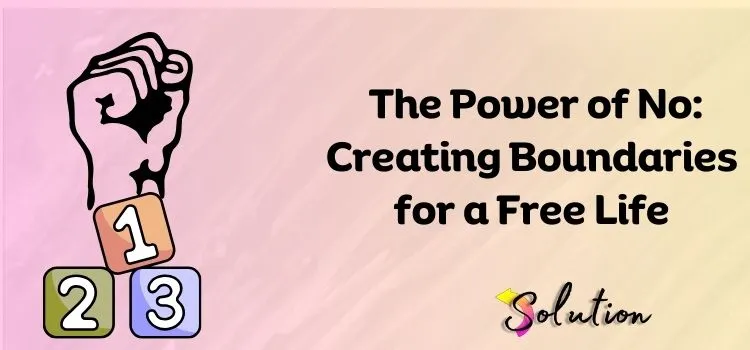
“I have to say yes, or they’ll get upset.”
Is this comment constantly running through your thoughts whenever someone asks for a favor? If you answered yes, then welcome to the introvert community! Introverts have difficulty saying “NO” to others. I believe it is the default option for us! Even if you know you have no bandwidth, you can’t say no. However, a happy existence strongly correlates with setting boundaries. This modern world is constantly begging for your time, energy, and attention. Trust me. Learning to say “no” is a strong ability that can change your life.
Saying “no” has a direct impact on your life, whether in a personal connection, at work, or at a social gathering. It encourages a more balanced, happier, and fulfilled lifestyle. If this resonates with you, stay reading! In this blog, we’ll discuss the necessity of saying “no” and how to do so without hurting people or surrendering your principles. Stop overthinking and begin learning this life-changing skill immediately!
Why Saying “No” Feels So Hard: What’s the Reason Behind This?
Do you ever wonder why you can’t say “no”? Let me explain the scientific cause for this ubiquitous difficulty among introverts. Introverts frequently struggle to say “no” due to a mix of psychological and neurological factors. One of the major reasons is “high sensitivity to social rejection.” This trait is linked to increased activity in the amygdala, the brain’s emotional processing center.
According to the research, introverts may have a higher reaction to unfavorable social interactions, making them more prone to avoid conflict or disappoint people. Furthermore, they are sympathetic and conscientious, which means they carefully examine how their words and actions influence those around them.
This increased understanding of social dynamics can lead to people-pleasing tendencies, in which saying “no” feels like a personal failing rather than a simple boundary-setting decision. This tendency can become ingrained over time, making it difficult for introverts to put their own needs ahead of others’ expectations.
What is the Importance of Saying NO?
Saying no is a difficult task, but overcoming it will make your life easier and make you feel more confident and guilt-free. This sensation of contentment can only be achieved by taking the initiative to learn how to say no. For your convenience, we’ve compiled the benefits of saying no. This can help you understand what you’ve been missing for a long time while also motivating you to control your overthinking and focus on your own growth:
- Mindful Living:
Saying “NO” helps you protect your emotional and physical health by lowering stress and burnout. According to experts, persistent people-pleasing activates the hypothalamic-pituitary-adrenal (HPA) axis, boosting cortisol levels in the body, resulting in exhaustion and anxiety. Setting limits allows the brain to better manage emotions, which improves general health.
- Personal Transformation:
When you start declining unneeded commitments, you will promote personal development by freeing up time for important goals. Maintaining Positive RelationshipsCognitive psychology research suggests that focusing on self-improvement enhances executive function in the prefrontal cortex, improving decision-making and goal-setting abilities.
- Maintaining Good Relationships
Clear boundaries promote more honest friendships. According to social psychology research, persons who assertively explain their limitations find less anger and greater relationship satisfaction because honesty creates mutual respect and trust.
- Empowerment
Saying “no” builds self-confidence and autonomy. According to a neuroscience study, expressing boundaries activates the ventral striatum, the brain’s reward region, which reinforces a sense of control while decreasing feelings of helplessness.
- Better Decisions
Saying “no” helps prioritize what is genuinely important. Neuroeconomic research demonstrates that when people set boundaries, they activate the dorsolateral prefrontal cortex, which is responsible for rational thinking and impulse control. This leads to better decisions, less regret, and higher life satisfaction.
Signs: It’s Time to Say “No” and Protect Your Energy
Understanding when to say no is a skill that will help you break free from the “yes” trap. This skill will improve your capacity to distinguish genuine alignment with our ideals from duties motivated by external pressures or internalized guilt. One successful method is to foster self-awareness by periodically checking in with ourselves before agreeing to any request or demand.
Paying attention to visceral reactions, such as feelings of resentment, tiredness, or discomfort, can be useful clues that saying yes is not in line with our true wishes or qualities. Furthermore, learning to trust your intuition can help you navigate the difficult balance of respecting your limits and sustaining healthy relationships. Running into minor indications like hesitations, uncertainties, or a sense of incongruence can provide crucial insights into whether a specific request aligns with your genuine needs and goals. Individuals can create a greater sense of discernment by increasing their sensitivity to internal signals and markers, allowing them to make judgments based on self-respect and integrity.
How Do I Begin to Learn How to Say “No”?
Learning to say no requires practice. Don’t worry; with confidence and the next few crucial steps, you can accomplish this. We have created a list of fundamental principles to make your process easier. Take a look and follow the same steps, and you will gradually notice a significant improvement in yourself.
- Know Your Priorities
Understanding your priorities is the first step toward learning to say “No.” When you have a clear understanding of what is most important to you, it is easier to deny requests that do not correspond with your goals or beliefs. Before committing to anything, consider whether saying “yes” will benefit your personal, professional, or emotional well-being. If it doesn’t, offer yourself the freedom to decline without guilt. Setting priorities allows you to make decisions that are in your best interests.
- Be Clear and Direct
When refusing a request, it is critical to be straightforward and direct. Avoid ambiguous responses that may allow for bargaining or pressure. A strong but polite response, such as “I appreciate the offer, but I can’t take this on right now,” expresses your position without ambiguity. Keep your answer concise and avoid over-explaining, as this can lead to unnecessary rationalization and make it easier for others to persuade you to reconsider your decision.
- Practice Saying “No”
If saying “no” makes you uncomfortable, practice in tiny settings to help you gain confidence. Begin with turning down minor requests, such as extra job assignments or social invites that do not fit into your calendar. Role-playing various scenarios with a buddy or in front of a mirror can also make you feel more relaxed. The more you practice, the easier it will be to say “No” when it really matters.
- Don’t Feel Guilty
Many people feel guilty about saying “no,” but it is important to remember that prioritizing yourself is not selfish. You do not have to meet everyone’s expectations, and attempting to do so might lead to exhaustion and resentment. Instead of feeling awful about denying a request, remember that setting boundaries is essential for your well-being. A firm “No” safeguards your time, energy, and mental health, allowing you to concentrate on the things that are actually important.
- Provide an Alternative (If You Want To)
If you still want to help but are unable to completely commit, suggesting an alternative might be an excellent approach to retain relationships while honoring your own limits. Instead of saying, “I can’t help with this project,” you might add, “I don’t have time to take this on, but I can help you brainstorm ideas.” This technique demonstrates your willingness to assist without overextending yourself. However, remember that providing alternatives is entirely optional, and a simple “no” is perfectly acceptable if it is what you require.
End note!
The ability to say “no” and set boundaries with grace is one of the most potent arts for improving your well-being, fostering healthy relationships, and promoting personal progress. It is understandable that some people find it difficult to reconcile societal expectations and fears. However, as you understand how to handle the issue, such as successfully speaking with them and practicing self-compassion, you will be able to say no with confidence and grace, without feeling guilty. Remember that doing activities that improve your life is the most valuable gift you can offer yourself. Begin stepping away from your overthinking and creating an environment in which you honor yourself and live a life that is consistent with your values and objectives.


